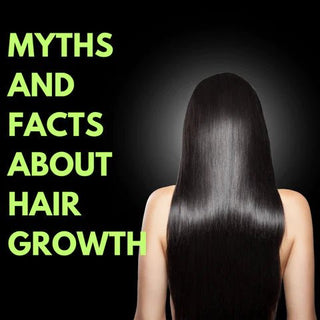Do you ever feel like you're doing everything right regarding hair growth, yet your hair just won't seem to budge? As someone who has struggled with hair growth, I understand how frustrating it can be to try all sorts of remedies only to be met with lackluster results.
But what if I told you that some of the most common beliefs about hair growth are nothing more than myths? That's right - from the idea that cutting your hair frequently promotes growth to the notion that certain foods can magically make your hair longer, plenty of misconceptions exist.
But don't worry! By separating fact from myth, we can discover the truth about what affects hair growth and how to best support our hair to reach its full potential. So, let's dive in and discover the truth about hair growth!
Myth #1: Cutting your hair regularly makes it grow faster.
Fact: This myth has existed for decades, but it's not true. Cutting your hair doesn't affect its growth rate, as hair grows from the roots in your scalp. However, regular trims can help prevent split ends and breakage, making your hair look thicker and healthier overall.
Myth #2: Shampooing your hair everyday makes it fall out.
Fact: Many people believe washing your hair too frequently can cause it to fall out or become thinner, but this is another myth. Keeping your scalp clean and healthy can promote hair growth by removing excess oils and dead skin cells. However, using a gentle shampoo and not overdoing it is important, as excessive washing can strip your hair of its natural oils.
Myth #3: Brushing your hair with 100 strokes daily makes it healthier.
Fact: This myth has been around for generations but is untrue. In fact, over-brushing your hair can cause damage and breakage, especially if you're using a harsh brush or pulling too hard. Instead, use a wide-toothed comb or a gentle brush, and avoid brushing your hair when it's wet, as this is when it's most fragile.
Myth #4: Stress causes hair to turn gray.
Fact: While stress can certainly impact your overall health, it doesn't cause hair to turn gray. Graying is a natural part of the aging process and occurs when your hair follicles stop producing melanin, the pigment that gives hair its color. However, stress can contribute to hair loss or thinning, so finding healthy ways to manage stress and care for your hair is important.
Myth #5: You can't do anything to change your hair's texture.
Fact: While genetics play a role in determining your hair's texture, several factors can influence it, such as diet, hydration, and hair care routines. For example, a deep conditioning treatment can help smooth out frizz and add shine, while avoiding heat styling tools can help prevent damage and breakage. By taking good care of your hair and experimenting with different products and techniques, you may be able to achieve the texture you've always wanted.
Myth #6: Plucking gray hair will cause more to grow in its place.
Fact: This myth has existed for a long time but is not true. Plucking gray hair will not cause more gray hairs to grow in its place. However, plucking your hair frequently is not recommended, as this can damage the hair follicle and cause hair loss. It's best to accept gray hairs as a natural part of aging.
Myth #7: Dandruff causes hair loss.
Fact: While dandruff can be unsightly and uncomfortable, it does not cause hair loss. Dandruff is common when the scalp becomes dry and flaky, but it does not affect the hair follicles. However, scratching your scalp excessively can damage your hair and cause it to fall out, so it's important to treat dandruff with gentle, medicated shampoos and avoid scratching.
In conclusion, understanding the myths and facts about hair growth is essential to ensure you take the right steps to promote healthy hair growth. While there is no magical cure for hair loss or a guaranteed way to make your hair grow faster, debunking some common myths surrounding hair growth can help you make informed decisions about your hair care regimen.
